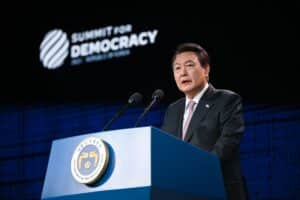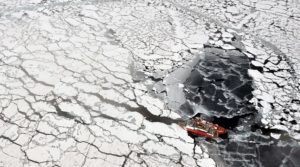South Korea
- History
- Economy
- Arctic Policy
- Recent Publications
- Links
- Experts
The Republic of Korea, hereafter described as South Korea and Korea, began its engagement in the Arctic in the 1990s through a number of unilateral and multilateral scientific studies, including a preliminary scientific study between 1993 and 1995 and joint research with Japan following the creation of the Arctic Council in 1996. Since the early 2000s, South Korea’s interest in the region has gradually grown with the promise of an ice-free Arctic and the fiercely coveted Arctic sea routes. The country organized the Korea Arctic Science Council in 2001 to both continue Korea’s scientific endeavors in the region and pursue research on the potential of the sea routes. Through the Council, South Korea conducted marine research with the Geological Survey of Japan and dispatched two researchers to a Chinese icebreaker to explore the Bering and Chukchi Seas.
In 2002, South Korea began to build its international commitments in the region by becoming a member of the International Arctic Science Committee and inaugurating its first research station in Svalbard, the Arctic Dasan Station. 2009 saw the completion of the Araon – Korea’s first research icebreaker – and the vessel’s maiden voyage. Since its launch, Araon continues to conduct annual research activities in the Arctic between July and August, in addition to resupplying South Korea’s two Antarctic research stations.
Former South Korean President Lee Myung-Bak, a strong advocate of Arctic engagement, visited Greenland and Norway in 2012 to discuss Korean involvement in polar research and development. Former President Park Geun-Hye, who took office in 2013, announced the Arctic as a priority for the national government to achieve a “creative economy” early in her tenure. Current President Moon Jae-in, who took office in May 2017, has South Korea gained observer status in the Arctic Council in 2013, and has since been actively engaged in the economic activities, policymaking, and research detailed in the other sections of this backgrounder. Moon is determined to build closer ties with Russia, through the New Northern Policy with the “Nine Bridges” initiative, which enhances economic cooperation between the states. In June 2019, he also became the first South Korean president to make a state visit to Norway, where he discussed with the Norwegian Prime Minister economic and maritime affairs in the Arctic
South Korea gained observer status in the Arctic Council in 2013, and has since been actively engaged in the economic activities, policymaking, and research. The country has also taken a very proactive stance towards the so-called Asian Arctic Club – consisting of itself, China and Japan – and hosted the fourth round of such meetings in Busan in 2019. By doing so, it seems keen on developing, and eventually promoting, a distinct Asian view on Arctic affairs; one that is respectful of the Arctic eight’s concerns and interests but softly refutes their call for exclusivity based on geographical proximity.
This page was updated on 1 August 2022. If we have missed anything, please contact info@thearcticinstitute.org.


